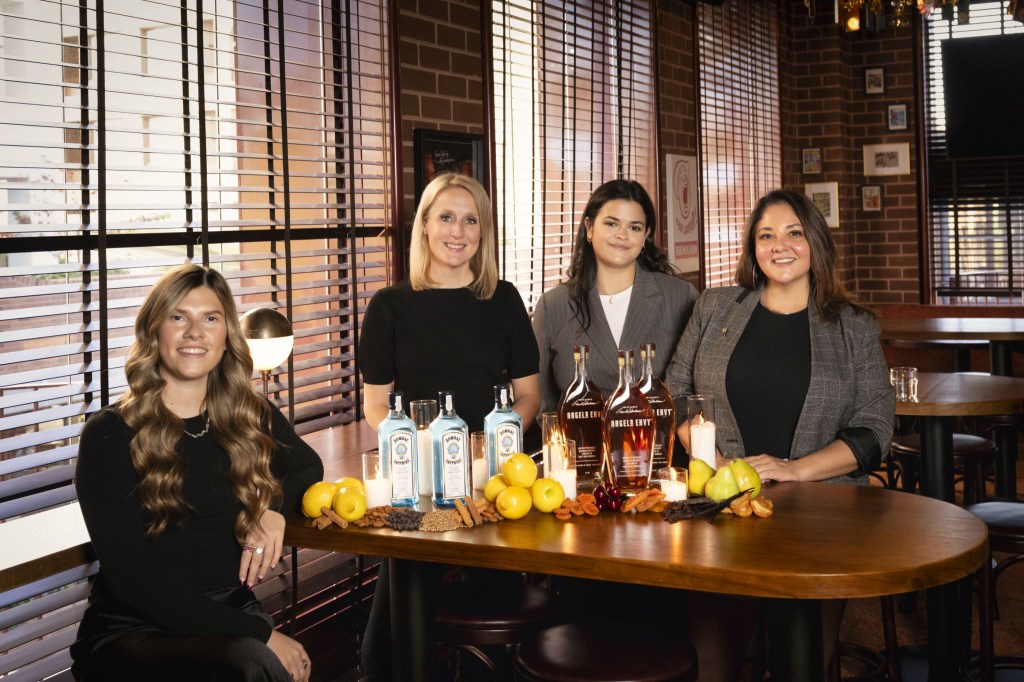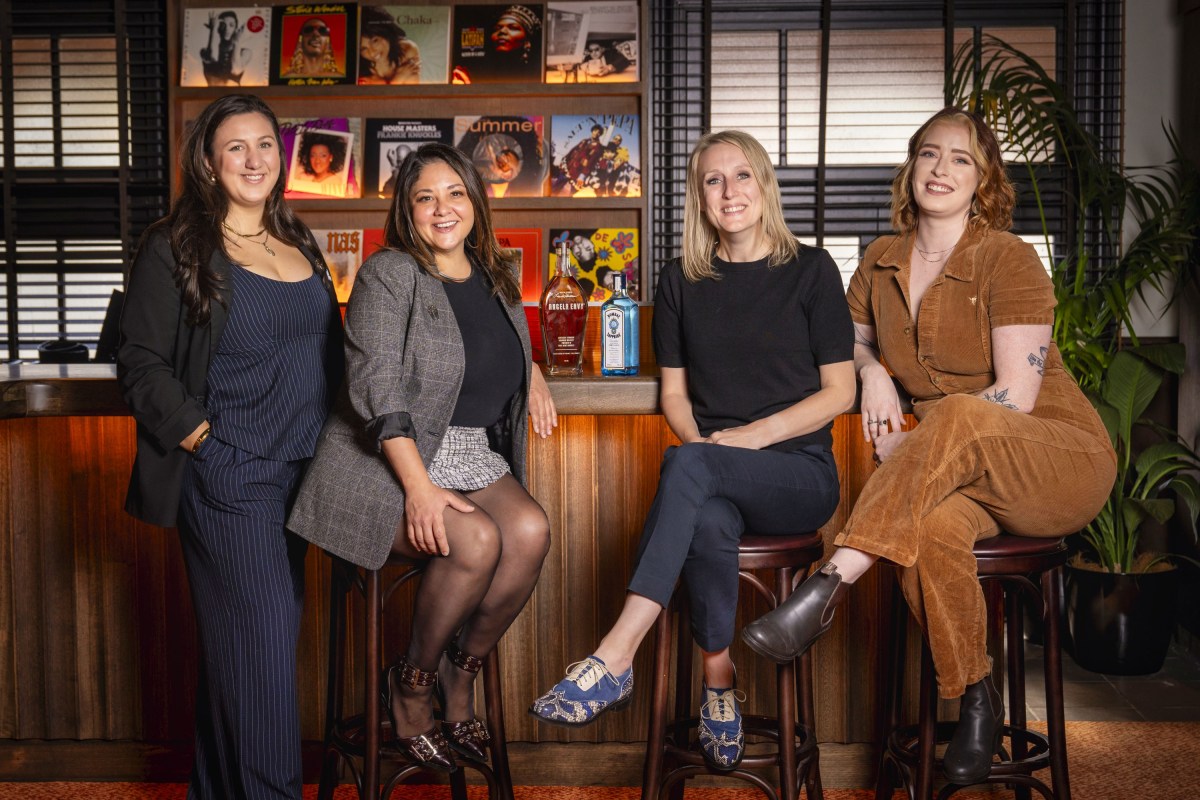On International Women’s Day every year, the voices and stories of women across the world are celebrated, as we address the issues that cause gender inequality and diversity. But despite these issues remaining, such voices and stories take a backseat once the day is done.
We think it’s worth doing the opposite and actively challenging the issues that create these gaps in our industry, which is why we launched our weekly Wednesday Women series, where we profile the stories of the inspiring women in this great and wide industry.
This week, we shine a light on Dr Anne Brock, Bombay Sapphire’s Master Distiller; Angel Teta, Angel’s Envy Global Brand Ambassador; and Alicia Clarke, Double Deuce’s General Manager and 2024 ALIA Best Bartender.
The three women with diverse backgrounds in the liquor and hospitality industries came together last week for a Women in Spirits panel to reflect on their unique experiences of the spirits and bar landscapes. The panel was hosted at Baptist Street Rec Club in Sydney by Bacardi Martini Australia’s National Brand Ambassador Kayla Grigoriou.
Though their careers span bars, brands and distilleries, the women on this panel shared a common thread: a deep understanding of how spirits and hospitality shape each other. Highlighting the shared language of their craft, Brock explained why she continuously looks to the bar industry for direction with distilling.
“[In distilling] you need to be connected to what’s going on in the outside word, not just what’s going on in gin, but what’s going on in bars. If I make a product that a bartender doesn’t want to use, it’s pointless.
“Bartenders are the canaries of trends – if you see something happening in a bar, you know it’s coming. It’ll take a while to hit the general consumer and the general public, but you know it’s coming when bartenders start getting interested in something,” she explained.
In demonstrating the interconnectedness of distilling and bartending, Brock also highlighted distilling as a career path for which bartenders would be well equipped.
“A lot of people ask me whether they need a science background, and I don’t think you do. I think what bartenders have got that you do need in distilling is the ability to do a process over and over again to a high quality. You’ve also a great palate, which you need to nose and taste the gin.”
Clarke also spoke about career progression, particularly in relation to longevity in the bar industry, having come a long way herself from the small bars in Hobart she once started out in.
Speaking to bartenders who are looking to step up or progress their careers, she said: “Initiative has a lot to do with it, and initiative is what’s going to get you noticed, and what’s going to make people look at you and say ‘this person wants this thing’. As a manager, I want people to show me that they want something.”
Enticing people back to bars, and keeping them there
Despite coming from three different continents, Brock, Teta and Clarke’s experiences reflect a strikingly similar landscape. Addressing the global industry challenge of reduced alcohol consumption, Teta emphasised the importance of keeping bars relevant, not only to attract new customers but to inspire the next generation of bartenders.
With many bars still feeling the effects of the post-Covid hangover, that approach looks different to everybody. Having had a long career on both sides of the bar, for Teta, it’s about reminding people that they should have a place to go and experience community beyond their home and their workplace. Engaging people once is sometimes enough to remind them that they miss it, she says.
“There is something insular with culture right now that we can’t prevent because of the cell phone, because of social media. But there’s something about being in the room, hearing the sound, hearing that side-conversation, it’s something you want to be a part of. If we can instill that back into people, they’ll naturally want to come,” Angel stated.
“With bars, it’s like ‘just walk through the door and see, you can always leave’ – but maybe it becomes a place you never want to leave.”

Getting people through the door is certainly the first step, but ensuring your bar is a place that people don’t want to leave is about much more than that, and good hospitality goes a long way.
“I came up in Portland at the time of the golden age of bartenders, and there was very much a sentiment of ‘I’m not making you a Mojito’, and it’s like, without them there is no us, so make the drink,” says Teta.
At Double Deuce, Clarke says 60 per cent of sales come from the cocktail list – the other 40 per cent are classics, and the team are responsive to customer requests.
“If someone comes to me and asks for an extra filthy Martini, I’m gonna make it. I’m not going to tell them how they have their Martini. Dirty Martinis are the thing right now and it was Sbagliatos last year, which is still a classic and we can still make it.
“If there was something strange to happen in trends that’s hard to implement and just give to people at the bar, I’ll think about it for the next menu. But by the time the next menu rolls around, there’s a new trend, so the best we can do is accommodate as much as we can.”
While Teta recognised the global attractiveness of trends, she said: “It’s more about applying the longevity of what we know from cocktail history to now, because everything’s cyclical, just like fashion.”
What do you know now, that you wish you knew when you started out in the industry?
“I wish somebody had told me that nothing matters. I know that sounds crazy, because everything matters ultimately, but in our industry, you’re not a doctor and I’m not a lawyer. We’re making people’s lives better in moments at a time, rather than decades,” says Teta.
“When you worry so much, the stress will be palpable in the event or in the drink. Life is going to go on, but if I’m stressed, my team is stressed and the consumer is stressed.”
The female future of the industry
When asked what we as an industry can collectively do better to uplift women in what is undeniably a male-dominated industry, there was a clear message that the path forward for women in drinks is being carved together.
“Being a female in the industry is still hard, but not as hard as it used to be,” said Clarke.
“The advice I would give to people is push against it. You can’t let it squash you, because if you let it, it will. I’ve fought against it a lot in my life… But the entire time I’ve been pushing against the narrative of what is expected of me, and what people think I should be doing.”
Brock added: “I think it comes down to manifestation and talking about it as a normality, so that people don’t think they’re an oddity when they come into it.”
Brock also emphasised just how important community and mentorship is to the future of the industry. Taking part in mentorships internally at Bacardi and also having external mentees, she sees the value in nourishing people who show an interest in the industry and empowering them to forge their own path.
Teta shared a similar sentiment, saying: “I’m always open, because I had a lot of cool mentors who did that for me and I learned so much from them. I feel it’s not only an honour, but a duty to do that.”

